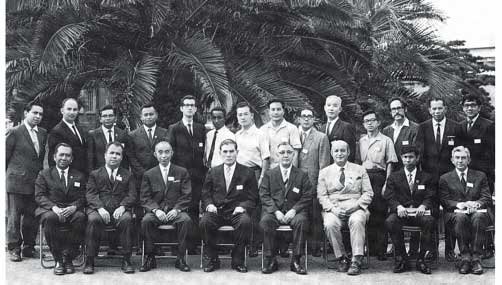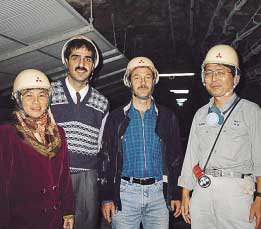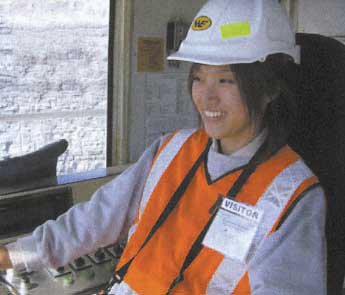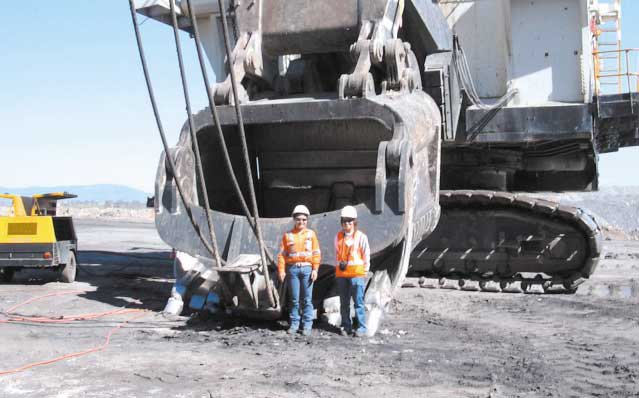International Training Programs
 |
| Participants and university staff of the first Geothermal Group Training Course in 1970. |
http://ere.mine.kyushu-u.ac.jp/Geothermal/TrainingE.html.
However, a new program was started in 2002, named the Renewable Energy Resources course. This course was a part of the Japan and Mexico Exchange Program and a maximum of four Mexican participants can attend. In addition to the geothermal courses, a JICA course on Coal Science and Technology was started in 1986, and continued for 14 years. The course also aimed to provide opportunities to learn and study advanced technology on coal science and its utilization for scientists and engineers working in the coal industry in developing countries. Faculty staff of the department also developed the technical program, and lecturers were invited from universities, private companies and national institutes. Eighty-five participants from 16 countries have completed the course.
 |
| Participants of Coal Science and Technology Course visited coal mine. |
http://www.c-shop.net/kyushu/
Internship Programs for Students
The internship program for undergraduate students has been held in our department since 1914. We call it as Jisshu. Their reports on internship were bound, and can be browsed at the department library. It was very impressive to find that reports in early times were beautifully hand written, and some even written in English. Kyushu once had a flourishing coal mining industry and most of the mines were located in Chikuho and Omuta areas in Fukuoka prefecture, and Matsuura area in Saga prefecture. Most students did their internships at coal mines before and soon after World War II, but a few were also posted to metal mines, oil fields and a few in mines in China and Korea. However, supply of the energy source in industry changed from coal to oil in 1950's. Consequently, the coalmines were closed down one by one, and finally the last two commercial coalmines in Japan were closed in 2001. However, demand for coal as a fuel source for generating power and in steel mills, has been increasing and the total consumption of coal reached 160 million tons in 2003. All of this coal is imported from overseas. Thus, demand for engineers specializing in earth resources is not as large as before, but steady demand remains among companies of mining, trading and oil exploration.
Under the difficult conditions of the earth resources industry in Japan, staff of the department decided to find sites abroad for internships. In 1987, one of the students was sent to Australia and completed his internship at Tom Price Mine in western Australia. Since then, the sites for internship have increased; from open pit mines of coal and iron ore in Australia to a geothermal research institute in New Zealand, a dolomite mine in the Philippines, and an oil service company in Thailand. The largest number of students per year who completed their internship abroad reached 11 in 1992, when eight went to Australia, and the other three went to Thailand, the Philippines and New Zealand respectively. This is one third of the total number of the third year students of the department. The total number of students who experienced their internship overseas reached 84 in 2003. The internships are scheduled in the summer holidays, usually from July to September, and its duration ranges from 10 days to two weeks for sites in Japan, but is extended to be about one month for overseas internships. One female student will also start her internship at Semirara coal mine in the Philippines in September 2004. Students are expected to study and learn the operational systems at each site in general terms as well as some aspects in more detail through this program. They are obliged to write and submit a report on their internship, and then in October, they make a presentation about their own internship for 15 minutes in front of the faculty staff, who make questions and comments. Students obtain a credit on completion of the presentation. During the internship at the site, students have the chance to see and understand what they have learned through lectures at university. Most of them are impressed by the large scale of mining operations in Australia and are fascinated by the resource industry. During the internship program, students stay with host families, and they can also experience the culture and daily life of the country. Students who wish to take their internship overseas take classes on technical English, mainly through reading papers related to the engineering fields in which they will work during their internship. The internship program provides good opportunities for students to enhance their motivation to study subjects on earth resources engineering and to have more interest in the resource industry where they will try to find their position after their graduation.
 |
 |
| A Female undergraduate student on the internship program in Australia. |
Another international program was started in 2001 as part of the ASEAN University Network/Support for Engineering Education Development Network (AUN/SEED Net) Project by JICA. This program aims to enhance education and research activities in nine engineering fields at 19 leading universities in 10 ASEAN countries with the support of 11 Japanese universities. The department of Earth Resources Engineering of Kyushu University has been nominated as a supporting institute in the field of geological and resource engineering. Gadja Mada University (GMU) of Indonesia has been assigned as a host institute in this field, and students who completed their undergraduate degree with good marks at other member universities can enroll in the graduate school at the Geological Engineering Department of GMU. Another role of the program is to provide higher education to staff members of the department of GMU who have not yet earned doctor degree. One of the staff from GMU has already started the program for his doctor degree in our department from 2003. Other than these activities, staff members involved in this program both in Japan and ASEAN countries attend field specific seminars held twice a year to present their educational systems and research achievements, and to discuss topics on mutual interests for improvement of educational methods and systems. As one of the activities of this program, faculty staff of our department made a short visit to GMU and gave lectures.
Our Future
Most energy resources and mineral resources consumed in Japan are imported from overseas. In particular, South East Asian countries will play an important role in exporting coal and other minerals to Japan. Furthermore, they need to develop resources for their own use. Under these situations, our experiences of education and research on earth resources engineering can contribute to improving the educational systems and enhancing the research activities at universities in these countries through the programs supported by both Kyushu University and JICA.
We believe that international research programs with participation of graduate students, and overseas internship programs for students, are good opportunities for all participants to develop their consciousness of internationalism. At the same time, staff members of the department are confident that we can improve educational and research levels in the field of earth resources and environmental engineering through cooperative work and research with universities and institutes in ASEAN countries.
Ryuichi ITOI
Professor, Faculty of Engineering